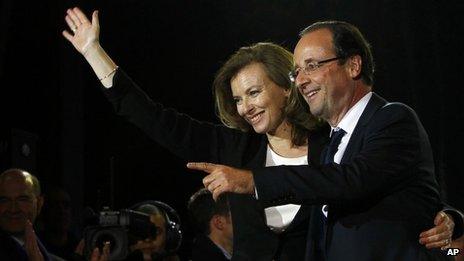Profile: Valerie Trierweiler, France's first lady
- Published

She came to the Elysee on the arm of President Francois Hollande, flushed with triumph over the woman who had been her rival.
But two years later, the wheel has turned.
Now it is Valerie Trierweiler who suffers the pangs of the scorned.
There will be unkind tongues that say it is as much as she deserved.
Certainly, she never built much of a rapport with the French public, and if - after her hospitalisation - she ends up quitting her functions as first lady, it is doubtful that she will be missed.
Personal rivalry
In May 2012, following Francois Hollande's election victory, she became France's first unmarried presidential partner.
The protocol took some time to work out - the American press called her "First Girlfriend" - but even more troublesome was the task of defining a role.
Because Ms Trierweiler clearly felt she represented a new breed of presidential consort.
Not for her the decorative distractions of a Carla Bruni-Sarkozy, or the prudish mumsiness of a Bernadette Chirac.
A journalist for Paris-Match by profession, Valerie Trierweiler had played an important role in Mr Hollande's election campaign.
She answered his post and was constantly at his side. Aides said he often turned to her for advice - often to the exasperation of more seasoned staff.
For Ms Trierweiler, the election was not just a question of ensuring a Socialist triumph.
It was also a personal battle she was waging against the woman from whom she had taken the president-to-be, Segolene Royal.
Disastrous gambit
Back in 2007 it had been Ms Royal, Mr Hollande's long-term partner and mother of his four children, who came within an ace of being elected to the Elysee herself.
That was when she was the star of the Hollande-Royal couple - the one destined for greatness while Mr Hollande languished as party secretary.
But in the end Ms Royal was beaten by Nicolas Sarkozy. And in her parting shot, she revealed that for the last two years her relationship with Mr Hollande had been a fiction.
In fact he was with the woman from Paris-Match.
Five years later, and a combination of flukes and clever strategy turned Mr Hollande into head of state. And so it was that Ms Trierweiler - not Ms Royal - walked up the steps of the Elysee.
But her critics say that the rivalry never left Ms Trierweiler. Ms Royal herself accused her of harbouring a "Rebecca" complex - after the Daphne du Maurier heroine who is obsessed by her husband's first wife.
Certainly Ms Trierweiler's first public foray from the Elysee was a disaster, clearly attributable to her loathing of Ms Royal.
During the parliamentary elections of June 2012, she sent out a tweet backing Ms Royal's opponent (also a Socialist but one disavowed by the party) for a seat in La Rochelle.
It caused major embarrassment, not least to President Hollande, who then persuaded her not to make further personal pronouncements.
Hopes quashed
According to an interview Ms Trierweiler gave last September to the Sunday Times, it was an awful time for her.
"There was a moment [after the tweet] when I didn't come back at all [to the Elysee]. I could almost have never come back. Then, well, I got over all that and came back bit by bit."
But her ambitions to be a new kind of first lady - independently expressing herself and keeping up a column in Paris-Match - were quashed.
She reverted to more conventional activities - accompanying the president on trips, and dedicating herself to charities and humanitarian causes.
In her interview with the Sunday Times, she admitted she had an image problem. "I'm not the nasty one people think," she said.
But the popular perception of her is that she is perhaps rather brusque and hard.
That may have something to do with her upbringing. Far from the privileged circles of previous first ladies, Valerie Trierweiler (nee Massonneau) grew up in a council flat in Angers.
She studied politics, then became a journalist. In 1995 she married another journalist, Denis Trierweiler, with whom she had three sons. They were divorced in 2010.
She has made her way in life by force of character, hard work and ambition. But perhaps she has never felt entirely secure about what she has achieved.
The revelations about Hollande's affair with Julie Gayet must therefore have come as a bitter blow.
To have fought so hard and won. And then to be brought low - and so publicly - by a beautiful younger rival.
That is indeed worth - in an Elysee spokesman's unofficial (under)statement - a "bad case of the blues".
- Published28 November 2014
- Published2 April 2014
- Published13 January 2014
- Published13 January 2014